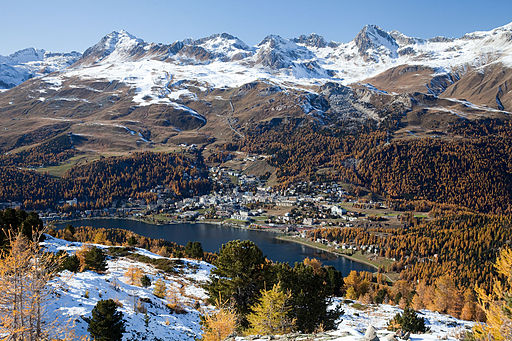
BidWeek, Reporting From Toronto, Canada – Next Monday, the International Olympic Committee (IOC) will elect its host for the 2026 Olympic Winter Games – 14 months after officially accepting seven applications from interested cities.
That may sound like a long time, but this process has progressed with relative lightning speed and in shorter time than recent campaigns that have typically lasted more than two years. And so much more took place during this sprint to the finish, a campaign that could help define the site-selection process for years to come.
It is also possible that it may be the last traditional Olympic bid race ever if the IOC members approve changes to the process that they’ll debate later this month and only hours after the 2026 host is crowned.
The two finalists, both regional bids from Sweden and Italy, were at the outset the least likely to sustain until the election that had been originally scheduled for September before it was moved up to June 24. But proposals from Stockholm Åre and Milan Cortina remained to see five other rivals drop from the fray.
Some cities began bid preparations years before the April 2018 deadline.
Switzerland began a domestic nomination process early in 2016 and went on to name Sion as its candidate in April of 2017. The well-organized and politically supported bid was coveted by the IOC as the perfect European winter sports location in the Olympics own home nation. But provincial taxpayers had a differing opinion, and in June 2018, 61 percent voted against a proposal to provide funding for the Games, essentially killing the bid that had to be withdrawn just hours later.
Seven Cities Officially Join 2026 Olympic Bid Race Before Door Slams Shut
Other potential bids fizzled out ahead of the application deadline, including a project first proposed in 2016 by two-time host Innsbruck in Austria. In October 2017 almost 54 percent of residents voted against hosting a third Games in the city, tossing sustainable plans into the trash heap.
Innsbruck’s downfall led to the rise of another Austrian city, Graz, where a new replacement proposal was quickly organized in time to apply for the Games ahead of the April deadline. But just as quickly, Graz’s campaign collapsed when the the Austrian Communist Party (KPÖ) in July successfully petitioned to force a referendum over the bid, and days later the fledgling project was canceled as politicians feared the negative backlash from a contentious vote.
In November 2018, a 2026 bid by Sapporo in Japan was officially launched by the same National Olympic Committee that was already organizing the Tokyo 2020 Summer Games. Many speculated whether the timing of the bid, that if won would represent the third straight Winter Games in East Asia, was wise.
Less than a year later in September, officials came to the same conclusion and were forced to shelve the bid to instead focus on a 2030 campaign. The decision was made after an earthquake in Hokkaido left 41 dead and caused considerable damage, shifting priorities in the region. Organizers also hoped that the delivery of new rail service to the city by 2030 would improve the transportation footprint for the later Games.
Voters Defeat Sion 2026 Olympic Winter Games Bid Ending Swiss Dreams
In April 2017 a bid from Erzurum in Turkey quietly emerged, but left observers wondering whether electing a proposal from the area that lacks suitable infrastructure in a politically volatile region would be prudent for the now risk-averse IOC. Apparently the IOC had similar thoughts as its Executive Board dismissed the project, dropping it from the 2026 shortlist that was drawn in October 2018, telling the rookie bidder to try again in the future when better prepared.
That left only Calgary, Stockholm and joint bidders Milan and Cortina in Italy to vie as candidates on the final lap of the race.
But not for long.
Canada’s bid from Calgary fell victim to municipal voter rejection last November when over 56 percent checked the ‘no’ box when asked if they support the project – along with the costs and risks.
1988 Winter Games host Calgary’s plans were honed from a comprehensive report developed by an exploratory committee that launched in September 2016, and all three levels of government were prepared to fully support and fund the plans if the taxpayers agreed.
Early this week a city report revealed that almost CDN $7 million (USD $5.2 million) was spent by the city to prepare for the ill-fated bid, part of a total of CDN $17 million (USD $12.7 million) doled out among Provincial and Federal partners.
56.4% Of Voters Reject Calgary 2026 Olympic Bid, City Council Expected To Cancel Project
With Calgary out of the race, the two remaining candidates doubled-down on the value of their widespread regional concepts that were in sync with the IOC Olympic Agenda 2020 and New Norms reforms, allowing for more flexibility in order to reduce costs and increase sustainability.
After both candidatures submitted bid books in January, Sweden’s bid was re-branded Stockholm Åre 2026, a move that seemed to counter Italy’s national concept, and draw focus away from the lack of city government support in Stockholm. The Åre government has instead embraced this bid, while the Stockholm Mayor plans to lease venues to the organizing committee if Sweden prevails.
Both bids missed the January deadline to document national government guarantees, an omission that in the past would have forced the city to withdraw from the race immediately – as another Italian bid, Rome, did when pursuing the 2020 Games and failing to get the Prime Minister’s signature.
With no apparent choice, the IOC’s Executive Director Christophe Dubi agreed to ambiguously extend the deadline until April, or even as late as the June 24 election, refusing to name a drop-dead date if no national support was forthcoming.
The two bids prepared for site visits from the Evaluation Commission by releasing new taglines. “Made In Sweden” was the message ahead of an March visit to the Nordic nation’s Åre, Falun and Stockholm.
“We Dream Together” was Italy’s mantra ahead of the IOC visit that commenced in Venice at the start of April, headed through Cortina d’Ampezzo, across Northern Italy and finally to Milan.
Two things became abundantly clear from the two tours, both of which I attended. One: the widespread Agenda 2020 compliant venue footprints would add many new challenges to the organization and hosting of the Games, and two: the IOC turned the chapter on transparency, giving the media greater access to the venue tour, the IOC members and the meetings that took place.
While there is no doubt that most athletes will compete at existing high quality venues in either Italy or Sweden (or even Sigulda, Latvia where sliding events could be held alongside the Swedish Games) and both concepts offer accommodations close to most venues, those venues will be spread far making return day trips almost impossible in many cases.
This issue is more prevalent in Italy where the competition sites will be more evenly disbursed without an obvious central point, a fact that will make attendance at the opening and closing ceremonies a big challenge for a majority of the athletes. In Sweden, many athletes will compete in Stockholm while some will stay in the satellite clusters.
Italian Prime Minister Conte Signs Guarantee For Milan-Cortina 2026 Winter Olympics Bid
Both bids met the IOC’s April deadline to produce government guarantees with Italy’s Prime Minister Giuseppe Conte doing so in dramatic fashion. Italian Undersecratary of State Giancarlo Giorgetti delivered the official guarantee letter to IOC Evaluation Commission Chair Octavian Morariu on the final day of the site visit on April 5.
Sweden’s support from Prime Minister Stefan Löfvén was equally thrilling, coming just hours before the April 12 deadline.
Both bids have defied formidable obstacles in order to appear on the final election ballot Monday, when about 90 IOC member will file electronic votes to determine a winner.
Stockholm’s bid for 2026 was initially “cancelled” in April 2017 by then-Mayor Karin Wanngard who said there was lack of political will to pursue the Games. It seemed likely that the project would simply be tossed aside as it was after a failed 2022 start.
Still, the bid committee led by Richard Brisius trudged on hoping the 2018 general elections would turn the tide but instead, a new city coalition government was formed on condition that no funds would be provided to the organization of an Olympics.
At Last Hour, Swedish Prime Minister Confirms Support For Stockholm Åre 2026 Winter Olympic Bid
The Swedish bid persevered, even as a hung Parliament made it initially difficult for the project to get a thumbs-up from the national government. In late 2018, Stockholm’s plans appeared to be an impossible dream, but the IOC’s increased flexibility and a persistent bid team that planned creatively to overcome the government hurdles have demonstrated that Stockholm Åre could become a viable Olympic Winter Games host.
The emergence of Italy’s bid seemed equally futile. Initially, there were no plans to pursue the Games on the radar of the Italian Olympic Committee (CONI) who had already won the opportunity to host next week’s 134th IOC Session in Milan (then scheduled for September). IOC rules prohibit host city votes from occurring within a nation that is on the ballot.
But Milan’s Mayor Giuseppe Sala hinted at the 2017 Lima Session that a bid was possible, telling me there that hosting a Games would be popular with citizens.
Initially, the use of venues in three cities, Milan and former Games hosts Cortina d’Ampezzo and Turin, was being considered. A power struggle developed between Milan and Turin – both hoping to lead the charge – making a triple joint bid impossible for political reasons. CONI dropped Turin from plans to instead focus on Milan and Cortina, and other venues across the two regions.
Snubbing Turin didn’t go over well at the national level forcing top government official undersecretary Giancarlo Giorgetti in September 2018 to declare the bid “dead” and to eliminate the possibility of any federal funding. The bid team and CONI moved forward unfazed.
After being approved as a candidate by the IOC in October, the IOC Session was moved to Lausanne to clear a path for an election with Italy on the ballot.
The bid remained popular among Italians, and the IOC reported that 83 percent support the project across Italy, softening the stance of the Prime Minister ahead of his signature to guarantee the Games.
This has been a bid process like no other, and it will be an unprecedented Games as well. And it may never happen like this again.
Hours after either Italy or Sweden are chosen to host in 2026, the IOC will likely vote to approve new bid process reforms that will further relax rules allowing the IOC Executive Board greater control of which bids appear on the final host city election ballot, and when these ballots will be taken. New Host City Commissions, one for the Summer and one for Winter, could shape and schedule each process as necessary in order to select the best candidate.
It is certainly a new frontier for the IOC, and the map will be started next week.
Robert Livingstone will be reporting from the 134th IOC Session and 2026 Host City Election being held in Lausanne, Switzerland from Wednesday, June 19. Follow him on Twitter @enotsgnivil to keep up-to-date.


